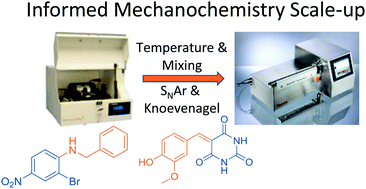Over the last several years, chemists and engineers have identified the utility of using twin-screw extruders for performing large-scale organic chemistry mechanochemically. This equipment is convenient as it is familiar to several relevant industries for its use in formulation, and it is also well-equipped for temperature control and intense grinding of materials. However, the research and development scale of mechanochemistry is just like that of conventional synthesis: milligrams. These milligram-scale reactions are performed in batch-type reactors, often a ball mill. Commercially available ball mills do not have strict temperature control, limiting the information that can be obtained to inform the scale-up process reliably. This work uses an in-house modified, temperature-controlled, ball mill to bridge the knowledge gap regarding predictable, well-informed, economical, and reliable mechanochemical scale-ups. Included in this work is the first extrusion example of a nucleophilic aromatic substitution.
